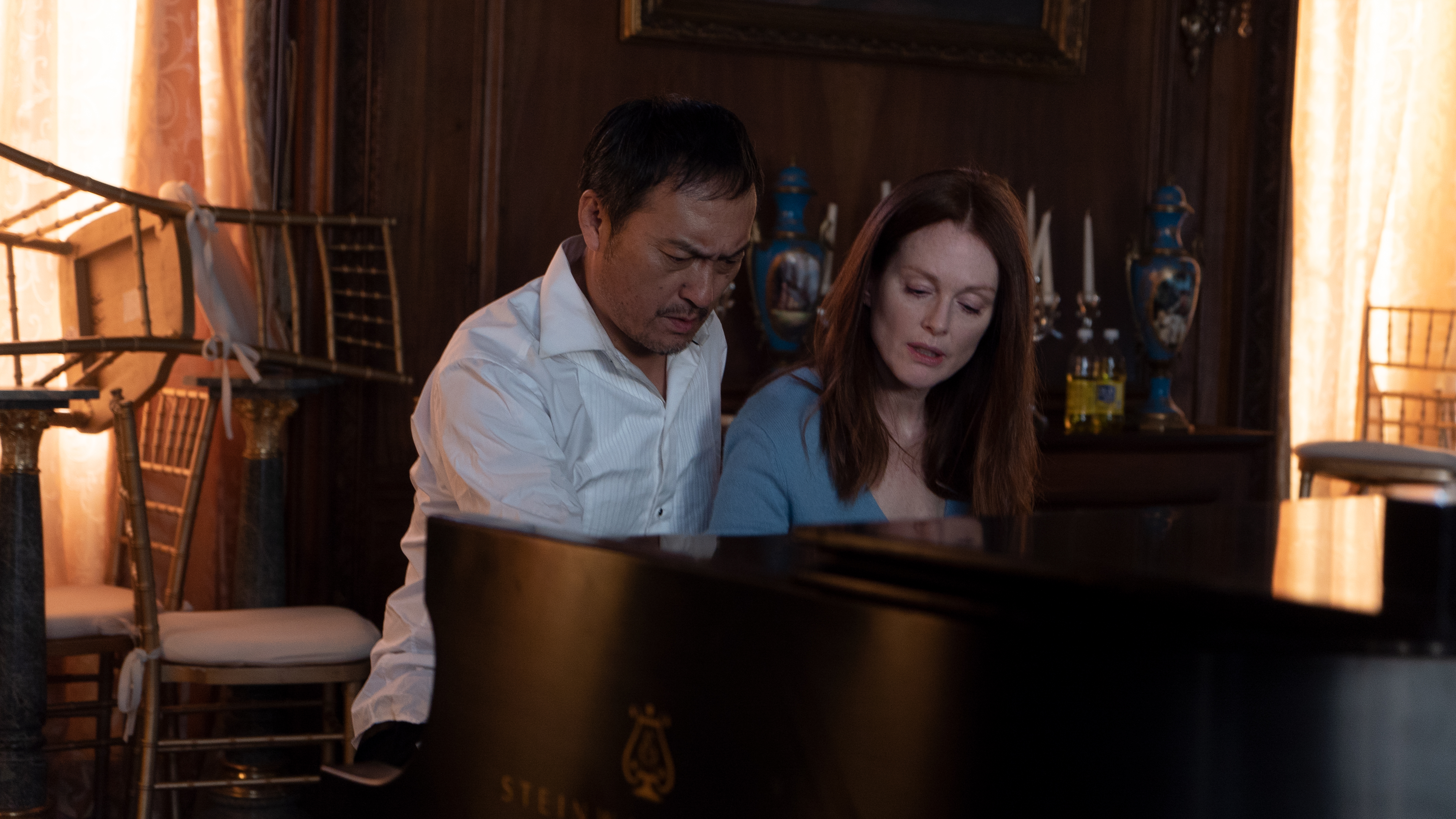Film Review: ‘Bel Canto’
By Guy Lodge
LOS ANGELES (Variety.com) – A brilliant, celebrated performer accepts a low-profile gig in unfamiliar environs, only to be trapped as the situation falls apart around her. But enough about Julianne Moore agreeing to star in “Bel Canto,” and let’s keep the focus on Paul Weitz’s po-faced hostage melodrama itself, which strands a world-renowned American soprano in the crossfire between an oppressive government and desperate insurgents in an unspecified South American nation. Ann Patchett’s much-lauded 2001 novel was optioned upon publication for its seemingly surefire cinematic fusion of high romantic and political stakes, yet until a sudden, bloody climax, this belated adaptation remains a blandly perfumed, low-peril affair.
With an enviable international ensemble — including Moore, Ken Watanabe and Sebastian Koch — all looking variously out of sorts, only an unseen Renee Fleming, who lends her gorgeously shaded vocals to the leading lady’s lips, emerges on song. Moore’s name will draw some interest from older specialist audiences when “” goes into limited theatrical and VOD release from Friday, but the actress’s most devout fans will quickly perceive that this is edgeless fare by her standards — a Europudding of American provenance, essentially. It goes unrewarded by her most fine-tuned gifts, though it does inadvertently honor her soap opera origins.
Patchett’s novel was inspired by the Peruvian hostage crisis of 1996, in which rebel group Tupac Amaru raided an official function at the Japanese embassy in Lima, taking hundreds hostage in an attempt to bring president Alberto Fujimori to account for a long list of human rights violations and political imprisonments. Like the novel, Weitz and Anthony Weintraub’s screenplay recognizably mirrors the real-life events — and even specifies the date — while keeping the South American geography deliberately fuzzy, thus allowing them to focus on an entirely fictitious tangle of human hearts within the embassy walls.
That said, even if the film did name a country, chances are platinum-voiced diva Roxane Coss (Moore) wouldn’t take much note. She’s introduced in a state of prima donna agitation, having deigned to perform at the embassy for an extortionate amount of money, while admonishing her agent on the phone never to send her beyond the U.S. or Europe again. The superfan responsible for pulling Roxane so far outside her usual flight path is wealthy Tokyo-based industrialist Hosokawa (Watanabe), who requests her presence as a condition for a Peruvian investment that he has no intention of completing. Could these two demanding, self-interested high-fliers possibly be a match? Watch this space.
Before we can get to this heartwarming romance, however, there’s a revolution to acknowledge, as armed guerrilla rebels violently disrupt Coss’s performance, shooting some attendees dead and taking the rest hostage until their demands — chiefly, the release of their jailed comrades — are met. Alongside Roxane and Hosokawa in the melee are French ambassador Thibault (Christopher Lambert), eccentric Russian businessman Fyodorov (Olek Krupa) and Hosokawa’s loyal translator Gen (Ryo Kase), none of whom is characterized all that far beyond their nationality.
Rather more interesting, albeit likewise underwritten, are the frustrated, morally conflicted rebels, including over-his-head commandant Benjamin (Tenoch Huerta) and questioning soldier Carmen (Maria Mercedes Coroy). It’s particularly gratifying to see a significant role for Guatemalan actress Coroy, following her striking debut in the festival hit “Ixcanul”: She gives the most affecting, unforced performance here.
Meanwhile, a dogged Red Cross negotiator Messner (Koch) attempts to defuse the situation as it drags across weeks; the real-life Peruvian standoff lasted four months, though aside from the occasional, somewhat contrived shot of prison-style wall scratchings to mark the days, the passage of time here is only vaguely felt. Between its minimal setup and frantic denouement, the middle stretch of this pleasingly multilingual movie sags shapelessly, as the hostages and even their captors gradually bond across cultural and linguistic barriers, with music — of course — as the language that binds them.
Despite chemistry between Moore and Watanabe that could at best be called cordial, Hosokawa’s wooing of Roxane feels moderately more credible than the attraction sparked between Gen and Carmen. Between all these dalliances, tender heart-to-hearts and dewy-eyed musical interludes, it’s easy to forget that the roomy, attractively appointed embassy, full of private corners and crannies for lovers to nestle in, is actually under siege. Indeed, were it not for some heavily underlined dramatic foreshadowing at the outset — “It’s opera, so in the end everyone dies,” Roxane merrily observes — the eventual drastic downturn of the situation might even come as a shock.
Working with material that offers little room for his customary drollness, Weitz steers proceedings in mostly functional fashion, where perhaps a little more operatic embellishment might have been welcome: Conservatively shot in tasteful olive tones by Tobias Datum, “Bel Canto” occasionally seems on the verge of breaking into the heated, high-camp belt that its faintly ludicrous spin on real events demands, until cooler, more televisual heads prevail. Ultimately, only Fleming’s arias have a true dramatic echo to them; that Moore’s lip-synching feels careful, effortful and somehow just off rather encapsulates the film’s wider problems.

